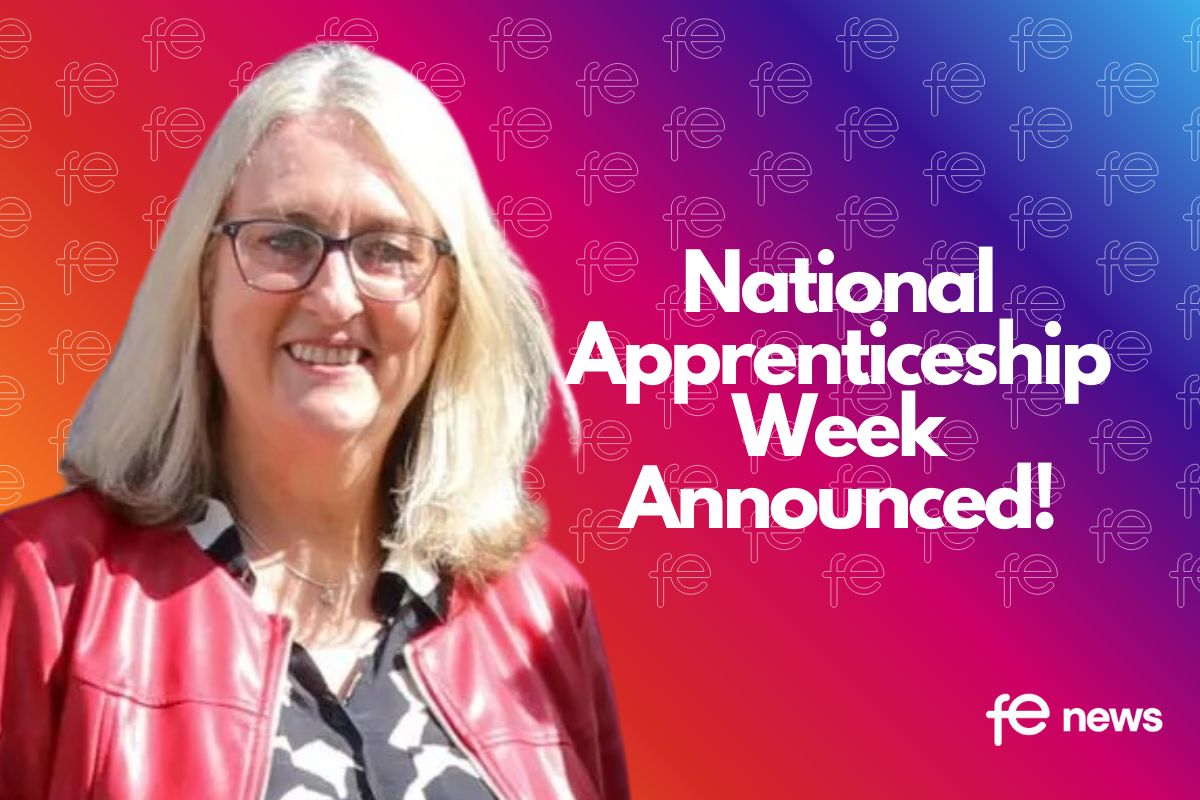Lifetime Skills Guarantee: Prime Minister’s plan to transform training and skills system

In a speech at @ExeterCollege on Tuesday morning (29 Sept) Prime Minister @BorisJohnson set out his plans to transform the training and skills system and preparing workers for a post-Covid economy, making it fit for the 21st century economy, and helping the country build back better.
Major expansion of post-18 education and training to level up and prepare workers for post-COVID economy
Adults without an A-Level or equivalent qualification will be offered a free, fully-funded college course – providing them with skills valued by employers, and the opportunity to study at a time and location that suits them.
This offer will be available from April in England, and will be paid for through the National Skills Fund. A full list of available courses will be set out shortly.
Higher education loans will also be made more flexible, allowing adults and young people to space out their study across their lifetimes, take more high quality vocational courses in further education colleges and universities, and to support people to retrain for jobs of the future.
These reforms will be backed by continued investment in college buildings and facilities – including over £1.5bn in capital funding. More details will be set out in a further education white paper later this year.
The coronavirus pandemic and changing economy is why the Prime Minister is developing a long-term plan to ensure that, as work changes, people can retrain, upskill and find new well-paid jobs.
MAJOR EXPANSION OF POST-18 EDUCATION AND TRAINING TO LEVEL UP AND PREPARE WORKERS FOR POST-COVID ECONOMY
 In his speech the Prime Minister is expected to announce a new Lifetime Skill Guarantee. He will say:
In his speech the Prime Minister is expected to announce a new Lifetime Skill Guarantee. He will say:
‘As the Chancellor has said, we cannot, alas, save every job. What we can do is give people the skills to find and create new and better jobs.’
‘So my message today is that at every stage of your life, this government will help you get the skills you need.’
He will add:
‘We’re transforming the foundations of the skills system so that everyone has the chance to train and retrain.’
Sector Response to the plans for a Lifetime Skills Guarantee
 Ben Hansford, Managing Director – Apprenticeships at Firebrand Training, has said it’s sticking a bandaid on the issue rather than fixing it:
Ben Hansford, Managing Director – Apprenticeships at Firebrand Training, has said it’s sticking a bandaid on the issue rather than fixing it:
“The Government’s announcement yesterday is a recycling of previous announcements – still no tangible detail with some very opaque “pilots”, that will link to “accredited level 3’s” which means a lot of out of “regulated” qualifications when people need reskilling in the latest up to date certifications and technologies.Hopefully, the Government will align with real world skills gaps for jobs that are needed today and address the huge skills gap in Digital and IT.
“It is crucial that there is ongoing investment into high priority skills to ensure the digital industry can continue to run and innovate efficiently during and after the pandemic.”
 Chief Executive, David Hughes said:
Chief Executive, David Hughes said:
“For many years, further education colleges have not received the recognition they deserve for the outstanding work they do for people of all ages and communities – and they have suffered from a decade of neglect during austerity. The Prime Minister’s speech today shows that he recognises this and supports the power and mission of colleges. It places colleges at the heart of the recovery, supporting people and employers in the recovery and renewal we all want to see. I am delighted that the government has decided to invest in colleges because they will help enhance people’s life chances for years to come.
“We believe that colleges should play a bigger part in a more collaborative education and skills system that allows people to train and retrain throughout their lives. Today’s speech is a strong sign that this thinking will form much of the foundation for the upcoming FE white paper and develop a system that works for all adults and not just those fortunate enough to go to university.
“A new entitlement to a fully-funded Level 3 qualification and more flexibility built into L4 and L5 are important steps forward as the government begins to implement the Augar Review. There is a lot more to do to stimulate demand from adults and employers and to support colleges to have the capacity to meet needs. I am looking forward to working with officials on the details and the legislation which will be part of the white paper later this year.
“We must get this right to ensure our education and skills system is fit for purpose – I hope the Prime Minister’s words are just the beginning on the road to a fairer and more accessible post-16 system for everyone who needs it.”
 Association of Employment and Learning Providers managing director Jane Hickie said:
Association of Employment and Learning Providers managing director Jane Hickie said:
“It’s good to see National Skills Fund being invested in extra and much needed funding for adult education alongside the adult education budget and we have recommended that the comprehensive spending review should integrate these two budgets and the National Retraining Scheme into a single pot which providers of all types can access.
“The next step after that is that adult learners should access the pot instead via properly regulated individual skills accounts, so we end up with a fully demand-led system like we now have for employers with apprenticeships.”
 David Gallagher, Chief Executive of NCFE, said:
David Gallagher, Chief Executive of NCFE, said:
“At NCFE, we welcome the Prime Minister’s announcement of a Lifetime Skills Guarantee. This is a positive step in the protection of the country’s workforce at a challenging time. We eagerly await further detail on the courses that will be funded, so we can support the Government’s ambition to help people to upskill and reach their full potential.
“The pandemic has already left unemployment at 4.1%, and there are huge challenges still to overcome as we begin to rebuild. It is vital that we do so with high quality FE options for people of all ages, so the government’s announcement is extremely timely. At NCFE we are working hard to understand the needs of learners, employers and communities and align our offer with economic and social priorities, at a national and local level. Our Go The Distance initiative, for example, is taking focused action on employment by supporting people to access high quality learning opportunities and achieve valuable outcomes – so it is encouraging to see a central commitment to this.
“Alongside this important reform, it is crucial that there is adequate financial support for these learners. The Government should carefully consider what maintenance support is available to those who need it, across both the FE and HE sectors.”
 Professor Julia Buckingham, the President of Universities UK and Vice-Chancellor of Brunel University London, said it could benefit millions of adults:
Professor Julia Buckingham, the President of Universities UK and Vice-Chancellor of Brunel University London, said it could benefit millions of adults:
“We have long campaigned for changes to student funding to better support flexible, part-time and adult learning. Today’s announcement is an initial step in the right direction. There is a strong economic imperative to improve flexible learning, and we are pleased that the government has recognised the role that universities can play in addressing skills shortages and upskilling existing employees.
“There has been a marked decline in adult learning in recent years, and as the nation looks to recover and rebuild from the impact of Covid-19, now more than ever we need fresh thinking and policy change to help people of all ages and backgrounds to reskill and retrain.
“Many universities are ready to scale up alternatives to the traditional three-year degree, and give more people chances to study elements of a course in a ‘bitesize’ learning model. This would allow people to develop skills in areas such as digital, entrepreneurship, business and public sector management, which will all be likely to benefit the UK’s recovery and boost local economies. It would also help those out of work in certain sectors – such as construction, engineering, and aviation – which have been hit hard by the pandemic.”
 Professor Ewart Keep, Commissioner for the Independent Commission on the College of the Future said:
Professor Ewart Keep, Commissioner for the Independent Commission on the College of the Future said:
“For too long colleges have been underutilised in meeting the challenges of our economy and society. It is welcome that today the Prime Minister is recognising them as institutions at the heart of recovery in communities across England.
“Today’s announcement for skills in England signals an important refocus on lifetime learning and accessible education. This will be key to recovery, boosting productivity and transforming people’s life chances at a time of great uncertainty. The new entitlement to a fully-funded Level 3 qualification and more flexibility in funding for FE and HE could help to unlock the skills of the nation. This commitment has to be reinforced by good quality advice and flexible financial support, something the Commission has been giving a great deal of thought to.
“The focus on skills is needed for economic recovery now, but it can’t just be about economic recovery from COVID. This has to be about building the foundation of a system that supports people of all ages in the future too as the world and jobs continue to transform. This requires major reform to create a fairer, balanced and more sustainable post-16 education and skills system.
“This has to be a priority for Governments across the four nations, and we look forward to publishing our recommendations for the College of the Future later this Autumn.”
 Becci Newton, Deputy Director, Public Policy Research, Institute for Employment Studies, said:
Becci Newton, Deputy Director, Public Policy Research, Institute for Employment Studies, said:
“A skills based response in this recession is something I strongly support and using / extending the existing policy framework to provide training options for those with low skills is incredibly important. There are some questions about whether a single Level 3 is enough for the most vulnerable – as people and employers need a rounded set of skills. A substantial Level 3 programme is likely to be most supportive of needs on both sides however, to reach a judgement we need to understand the qualifications that will be funded and how these add value. There is a risk here given the restructuring of vocational qualifications in recent years. There is also a question about the funding level and whether it will be enough to attract people to training.
“And people who have already been working may prefer some shorter schemes that support sector-transfer such as sector-based work academies or at least a system that accredits their prior learning and experiential learning rather than taking them back to the start. The 13 week provision is welcome, but branding it a bootcamp could be unhelpful. We have some existing models from the national retraining scheme that we should consider.”
 Neil Carberry, Chief Executive of the REC said:
Neil Carberry, Chief Executive of the REC said:
“It’s right that the government takes action on skills. Avoiding a damaging unemployment crisis will depend on people who have lost jobs transitioning into new roles that are in demand. Today’s announcement will go some way towards that. But more must be done.
“Looking at how apprenticeships can be done differently is overdue but the right move now. However, more flexibility to use the levy for shorter courses is still needed to allow the recruitment industry to help temporary workers on their books train and progress in their roles. Allowing temp workers to gain forklift truck licenses and to provide additional health and safety training for social care workers, for example, is what employers and workers need. For many, this quick and practical training is better than a two year apprenticeship. Our data shows that temporary workers are being relied on by employers to build back right now so tailored help in that area is common sense. Time is of the essence.”
 Helen Barnard, Director of the independent Joseph Rowntree Foundation said:
Helen Barnard, Director of the independent Joseph Rowntree Foundation said:
“The coming wave of unemployment will require bold action and enabling people to access training is a hugely important part of that. The Conservative manifesto pledged an ambitious Right to Retrain and JRF has been calling on the Government to implement that promise – today’s announcement is an important first step towards doing that.
“Today’s announcement should be the beginning of a more joined up system of life-long learning, which needs to include further investment in basic skills provision. As well as offering training itself, people need to be able to access it, and this means being able to access childcare, and targeted support must be available for areas with weaker economies and fewer jobs.
“We are approaching a winter of joblessness and people whose jobs are being deemed non-viable also need urgent support to avoid being pulled into poverty. If people who are out of work are facing a long wait to retrain then we need to ensure that they and their families have a lifeline – the government must extend the £20 uplift in Universal Credit and offer it to people claiming legacy benefits too.
“This is the right starting point for the Government but more urgent support is needed to make work a reliable route out of poverty and to help the worst off to face the coming storm.”
 Liberal Democrat Education Spokesperson Daisy Cooper said:
Liberal Democrat Education Spokesperson Daisy Cooper said:
“Liberal Democrats have long called for greater equality between academic and technical education, and funding for adult education and retraining. We urge the Government to look at the details of our Skills Wallet proposals as they put meat on the bones of their new scheme.
“After the chaos which has characterised the Government’s management of our education system this year, we must see the detail of what is being offered and how it will be rolled out, in order to know if this will go far enough to meet the needs of future students and the sector.
“We also need to know what the Chancellor is going to do to help the three million people still excluded from any support and avoid mass unemployment, as well as what incentives he’ll create for investment in our industries – especially the green economy.”
 Commenting on the announcement, Mark Farrar, Chief Executive at AAT, said:
Commenting on the announcement, Mark Farrar, Chief Executive at AAT, said:
“However, with unemployment already on the rise it is somewhat concerning that this offer will not start until April 2021.
“By then, it is predicted that a million or more jobs may have gone.
“And, with further education under huge financial stress, the funding required to deliver these additional courses will be needed sooner rather than later.”
 Chair of the Education Committee, Rt Hon Robert Halfon MP, said:
Chair of the Education Committee, Rt Hon Robert Halfon MP, said:
“Today’s speech by the Prime Minister demonstrates a real commitment to the role of adult education and skills in our country’s economic recovery. The removal of the age cap for free level 3 courses and more flexible higher education loans have the potential to open up opportunities for people who previously may not have had the chance to benefit from further learning.
“The Education Committee’s current inquiry into adult skills and life-long learning is looking at how we can tear down barriers to participation. The Government must now make sure that learning throughout life is made as easy as possible. It must be truly open to people from all backgrounds. This will be vital if we are to tackle social injustices and plug our country’s skills gaps.”
 Professor Tim Blackman, Vice-Chancellor, The Open University said:
Professor Tim Blackman, Vice-Chancellor, The Open University said:
“Removing policy and funding barriers to flexible part-time adult learning has long been needed as people increasingly need support for study throughout life. The pandemic has reinforced the fact that access to learning throughout our lives is an economic and social necessity.
“The ability to have funding for smaller segments of learning, and the flexible lifelong learning loan entitlement announced today are positive steps to address this. Though to ensure it gives people of all ages the skills they need, the entitlement must enable those who already have a degree earlier in life to retrain, and it must prioritise the current workforce.
“Flexible part-time higher education enhances productivity and strengthens the economy, to the benefit of employers, employees, wider society and the Exchequer. It is essential to the UK Government’s aspiration to level up opportunity across the country and is crucial to the success of the UK Government’s plans for higher technical education.
“With its scale and reach across all parts of the country, The Open University has a key part to play in re-setting and transforming the foundations of the skills system, helping to make it fit for the 21st Century. We look forward to working with the UK government to deliver this.”
 Stephen Lambert, Director of Education4Democracy CIC, said:
Stephen Lambert, Director of Education4Democracy CIC, said:
”Anything that addresses the Youth Jobs crisis is to be welcomed. Free FE college courses leading to level 3 qualifications for those aged over 23 is one sure way of helping to skill-up or re-skill young adults prone to long-term unemployment.
“However, the PM needs to go further. The collapse of the youth labour market means that reforming both post-16 provision and adult education needs to be combined with much broader social and economic policies.
“There’s a clear need to revive the old Community Programme of the eighties and New Labour’s Future Jobs Fund which created valuable paid work experience which often led to paid jobs in key areas such as conservation and heritage and helped to reduce long-term youth unemployment.
“Government need to give serious consideration in devising a ‘Youth Contract’ or even a ‘Youth Income’ to give marginalised young people a stake in both society and the economy.”
 Adrian Grove, Business Development Director, of Qube Learning says:
Adrian Grove, Business Development Director, of Qube Learning says:
“Qube Learning are delighted to hear that the Government have committed to supporting more adults to gain new or additional skills that will support and increase the opportunities for individuals gain employment. As always, the devil will be in the detail and we will have to wait and see if these opportunities will be open to ITP’s as well as Colleges.
“Qube have historically used it’s Adult Education Budget to support 19+ adults to gain valuable skills, this lifetime skills guarantee should lead to further education establishments creating an increased number of opportunities for adults to valuable skills that employers are demanding”
 Dr Mary Bousted, Joint General Secretary of the National Education Union, said:
Dr Mary Bousted, Joint General Secretary of the National Education Union, said:
“These steps to prevent loss of apprenticeships and support adults returning to study are welcome. But this is not ‘building back better’, it is simply building back from the cuts to the Further Education sector since 2010.
“As the Education Secretary notes, productivity is only 4% higher than in 2008. Major reinvestment is needed to reverse the 50% cuts to adult learning and cuts to college funding, pay and learner entitlements. It is not being churlish or carping to question whether, so far, this really is ‘building back better.’”
 Steve Radley, CITB Policy Director, said:
Steve Radley, CITB Policy Director, said:
“More funding and training flexibility for employers through the lifetime Skills Guarantee announced by the Prime Minister today is a critical first step to support construction’s recovery.
“Changing apprenticeship funding rules to recognise prior learning and allow large employers to spend surplus Apprenticeship Levy funds in bulk will be vital to ensure the apprenticeship programme can more flexibly respond to industry’s skills needs.
“This is something that CITB and the CLC has engaged with Government in the Roadmap to Recovery plan, and I am delighted that the Government has listened.”
 Liz Bromley, CEO of NCG commented:
Liz Bromley, CEO of NCG commented:
“NCG welcomes the Prime Minister’s focus on skills and the role which FE can play in levelling up our country. For too long colleges have been the forgotten middle child of education. Today’s announcement links clearly to our own mission of creating social mobility, through economic prosperity. In particular we welcome this positive step forward for adult learners.
“Adult and lifelong learning have long been neglected in the realm of education policy. This lifetime guarantee will help to meet the combined challenges of technological change, Brexit and the post-COVID economic landscape that will shape the next few years.
“We look forward to working with the government to ensure that the expected FE White Paper delivers the same confidence and security to every learner, community and college in our country.”
 Andrew Harding, Chief Executive — Management Accounting, The Chartered Institute of Management Accountants, part of the Association of International Certified Professional Accountants, said:
Andrew Harding, Chief Executive — Management Accounting, The Chartered Institute of Management Accountants, part of the Association of International Certified Professional Accountants, said:
“The Government’s new measures to boost employment opportunities in the post-Covid-19 economy are to be welcomed, and will help transform our skills system for the better. However we must not solely focus on changing policies to be successful, we must also put great emphasis on changing employee’s mindset when it comes to addressing some of the systemic issues exacerbated by the pandemic (e.g. UK’s faltering productivity, widening skills gap and failing social mobility). Worryingly CIMA’s research in 2019 revealed that 37% of UK workers didn’t feel that they need to learn new skills despite a growing awareness of the impact of technology on jobs. This complacency towards learning and development was nagging issue prior to the coronavirus crisis but has now become an acute problem for UK businesses and could hamper our long-term recovery.
“If we are to get the economy back on its feet, remain competitive on the global scene and sustain growth, we must now invest wisely into developing a skilled, motivated workforce, think about changing the Apprenticeship Levy to an Apprenticeship and Skills Levy for all workers to ensure businesses have the talent they need now and in the future; continue to invest towards higher level apprenticeships to raise the skill levels of the UK workforce; and introduce a rebuttable right to retrain to empower workers to request further training and development. If such measures are adopted, we might then really be able to drive real-wage growth, address social mobility and become a productive economy.
“We are now at a crossroads – the choices we make now will make or break our success.”
 David Robinson, Director of Post-16 and Skills at the Education Policy Institute (EPI) said:
David Robinson, Director of Post-16 and Skills at the Education Policy Institute (EPI) said:
“While it is important to wait for the full details, these new measures are a positive step from the Prime Minister. Compared to other developed nations, there is a chronic lack of basic qualifications and skills among adults in England – our research shows that as many as 1 in 3 adults do not have a qualification equivalent to A level or above.
“There is significant employer demand for these qualifications, and research shows that they lead to higher wages and productivity. It’s right that the government is working closely with employers to establish a list of technical courses that will be part of this scheme.
“It’s important that we reduce the barriers to access for adults, so that they are able to take up these new education opportunities. Although the government has offered flexibility in study time and location, it must also ensure that living and other support costs should not get in the way of those wishing to improve their qualifications, otherwise many will struggle to access these courses. That is why we have called for the government to offer maintenance support for adults studying these qualifications.
“The timing of this scheme, beginning in April 2021, may prove costly for those immediately out of work over the next six months. With the bulk of these qualifications requiring a year or more of study and difficult labour market conditions expected to persist, the government should consider what support it can offer to help bridge the gap between studying and finally securing a job.
“In the long-term, if delivered effectively, the Lifetime Skills Guarantee will boost skills and may help many people to retrain and recover from the effects of the pandemic.”
 Federation of Small Businesses (FSB) National Chair Mike Cherry said:
Federation of Small Businesses (FSB) National Chair Mike Cherry said:
“Now more than ever it’s vital that we provide opportunities for all individuals to succeed and thrive in their adult and working lives. Today’s speech by the Prime Minister gives some detail into how the government hopes to address the shortfall in adult education, re-training and technical skills.
“This has been an area long neglected, and at a time when the job market is in turmoil, it’s crucial more than ever that people are given the tools they deserve in order to enjoy a better quality of life.
“The pandemic has changed our economy, and it’s only right that how people gain access to life-changing education also changes to adapt to the new economic landscape we now face in the coming months and years. And small businesses are inextricably linked to job creation, which is why these announcements are so important.
“However for this system to work it is vital that it’s co-designed with smaller businesses front and centre. Small businesses have long been crying out for enhanced technical skills and the much welcomed fully sponsored college courses for adults without an a level or equivalent, will need to reflect the major skills shortages in the resident labour market.
“The announcement of a lifetime skills learning guarantee could be game changing as will making it easier to access government backed finance for FE courses.
“What is crucial to upskilling the nation, is also addressing the skills gaps the country faces. So FSB has welcomed the new recommendations by the MAC to include senior care workers and other roles such as welders onto the Shortage Occupation List (SOL), which FSB had asked the Government to do, on behalf of FSB members concerned about their workforce.
“The pandemic has highlighted the value of social care workers and the challenging nature of their work. Moreover, there is a significant recruitment challenge within the sector that cannot be solved from the UK labour market. Without doubt, changes in immigration rules will not solve the issues within the social care sector, and so Government policy should not seek to impose further constraints on a sector struggling to survive.
“It’s also very good to see the MAC recommend additional roles on separate SOLs for Wales and Northern Ireland highlighting the distinctive needs of small businesses in each nation.
“Apprenticeships are hugely important both for small businesses looking to expand their workforce and for the individual who can learn on the job and set themselves up for the future.
“So it was welcome to see incentives that were announced earlier this year, being set out to support small firms wanting to take on an apprentice.
“Young people’s employment outcomes are being disproportionately impacted by the covid-19 crisis. We know that 92% of all apprenticeships offered by smaller businesses in England are held by 16-24 year olds. Whilst we welcome the financial incentives introduced for small firms that hire offer apprenticeships that were announced at the summer economic update, more needs to be done to support smaller businesses to hire apprentices including reducing upfront recruitment costs which would be a huge sign of support to many cash strapped small businesses.
“The introduction of digital skills boot camps along which have been successfully trialled already in parts of the country are another key step to ensuring that young adults and those retraining, have the right skills that they need to either get onto, or back onto, the jobs ladder. But it is vital that these boot camps engage and work with small businesses so that they can truly benefit those in training as well as small firms.
“Both the Chancellor and the Prime Minister have acknowledged that not every job can be saved, but we must pull out every stop to save as many as possible, to safeguard the future of thousands of small businesses and jobs as well as the livelihoods of millions.
“There is no single solution to the economic crisis we now face, and this requires the government to do all it can ensure that small businesses, who are the backbone of the economy, have the support that they so desperately need.”
Kurt Hintz, Interim Executive Principal of Capital City College Group, said:
“We are delighted that the Government has announced it will offer free Level 3 courses to adults. We know that the biggest barrier to people enrolling on any course is its cost, so we already provide all our courses up to and including Level 2 (GCSE equivalent) for free to everyone, and one of our colleges – the College of Haringey, Enfield and North East London (CONEL) – has done this since 2017. In that time, thousands of people from across London have enrolled on a free course, in subjects from Accounting to Travel & Tourism, and from bricklaying to Science – using it as a stepping stone to higher level qualifications, or into an apprenticeship or other job.
“As well as our free courses up to Level 2, we also offer a wide range of free short courses at Level 3, enabling even more adults to gain new skills, and we are delighted that the Government is building on this and making this opportunity available to more people.
“However, we are concerned that the funding for these free courses won’t be available until April 2021. People whose job prospects have been affected by COVID-19 need help to get learning and boosting their skills now, not in seven months’ time, and we’d urge the Government to make these funds – and the list of qualifying courses – available much sooner.
“We also note that when the funds are made available, it will be through the National Skills Fund. CONEL is part of the Capital City College Group, which is London’s largest provider of further education courses, and we’d like the funds to be added to the adult education budget, which in London is devolved to the Mayor. This would give much more local accountability and would also make it easier for colleges across the capital to access these funds and get Londoners learning faster.”
James Newby, NMITE Chief Operating Officer, said:
“Following the Prime Minister’s comments earlier this week about how the Covid-19 pandemic has “massively accelerated” economic changes that would require new “technical know-how”, and his promise of a radical shake-up of adult education, we at NMITE welcome this move and agree that the time has now come for a new approach to education.
“We are a higher education provider in integrated engineering with a disruptive pedagogical design. Our aim is that our future students will learn through hands-on work, on real world challenges, in groups, developed with employer and community partners which will help equip, skill and prepare them for jobs as engineers and ensure that NMITE learners will graduate work-ready.
“We believe that this approach of learning-by-doing will equip our prospective learners with the skills employers are now demanding and contribute to a bright future for engineering on a global scale.”
Helen Booth, Director of The HomeServe Foundation said:
“It’s really positive that the government has recognised that there are sectors in this country where access to relevant and emerging skills are low.
“Increasing supplies of individuals trained via the apprentice system to a high standard will be hugely welcomed by the construction, home repairs and improvements industries. Government targets such as the £2bn Green Homes Grants, for example, will require a significant increase in skilled workers to carry out the work over the coming years.
“What we need to see now is evidence that this effort will also translate into support for small employers to grasp the opportunity to contribute to the economic recovery by employing and training more apprentices and increasing productivity.
“We hope the Government will consult with delivery partners on the ground to ensure these new measures can have the levelling-up, skills and employability impact they were intended to do.”
Nicola Inge, employment and skills director at Business in the Community, said:
“The Prime Minister’s announcement today may have been precipitated by COVID-19, but we have been waiting a long time for due consideration to be given to lifelong learning. For far too many years, further education has been seen as the poor relation and we believe that this government is serious about changing that.
“However, we cannot agree these reforms are really radical: one college course is a long way from a lifetime guarantee and will do little to help those in left-behind areas of the country who already struggle to access training. Meanwhile, a focus on the skills employers need is easier said than done in the face of a global pandemic and economic crisis: at the very least, the government should help businesses by recognising a common language for essential skills development like the Skills Builder Universal Framework.
“Until these issues are addressed, we can only hope that today’s plans are a sign of bigger things to come.”
NUS’ Vice-President Further Education Salsabil Elmegri said:
“At NUS, we have been campaigning for the age cap to be removed from Level 3 courses for years and I know that this change would not have happened without the pressure of students and students’ unions. This change could open up education to a whole group of people who have previously been unable to improve their skills due to unfair funding caps. However – especially now – with so many people looking to reskill, it’s crucial that the government doesn’t just stop at funding the first qualification – people have to be able to take up education when they need it.
“I am concerned that the government will only allow people to take courses based on what’s valuable to employers. I would like to see students have a full range of options that will benefit them available and of course funded.
“NUS campaigned for lifelong education funding as a core part of our National Education Service campaign last year. We’re glad that the government appears, at least, to have listened to students on this one and will look at developing a learning allowance, but we will be watching closely how they deliver it. Covid-19 has unveiled the shocking inequalities in education, and students and students’ unions have been vocal in forcing the government to action. I would like to hope that this is the beginning of the government making up for its shocking record of abandoning students and young people, however we will have to keep up the scrutiny and wait and see.”
 David Thomson, head of external affairs at Association for Project Management (APM) said:
David Thomson, head of external affairs at Association for Project Management (APM) said:
“We welcome the government’s ambition in its plans to transform the training and skills system and prepare workers for a post-Covid economy. As the chartered body for the project profession, we believe project management provides excellent life-skills, is valued by employers, and call for project management to be included within the scheme, with our online project fundamentals qualification an example of the sort of practical course that might help. In an era of unprecedented change, the need for project based skills and working is only going to increase, and the project profession will be at the heart of creating and delivering change.
“The economic disruption created by the coronavirus pandemic creates a moment of opportunity to kick-start a new approach to skills, including project management as a life-skill for all professionals returning to education or training.”
 Andy Norman, Research Analyst, Centre for Progressive Policy commented:
Andy Norman, Research Analyst, Centre for Progressive Policy commented:
“The Centre for Progressive Policy has consistently argued that the UK will need to reskill for recovery from Covid-19. It is encouraging to see the government today act to boost adult skills participation, a key missing piece of the Chancellor’s Winter Economic Plan announced last week.
“The move to offer fully funded courses to all those without a Level 3 qualification is an important step towards this, and the expansion of the online skills toolkit is a welcome attempt to build on the momentum for online learning.
“However, more must be done. The expanded funding for Level 3 qualifications won’t kick in until April, five months after the furlough scheme ends in October – leaving over 2 million people facing a long winter locked out of the labour market. Nor is it new money. It will be paid for out of the National Skills Fund, a policy designed for a pre-pandemic labour market that no longer exists. Today’s announcement is also a missed opportunity to support adult learners financially while they retrain. CPP has called on the government to introduce a Learners Living Allowance to address this key barrier to adult learning in this country.”
 Kirstie Donnelly MBE, CEO at City & Guilds Group, commented:
Kirstie Donnelly MBE, CEO at City & Guilds Group, commented:
“It’s pleasing to see the prime minister take on board some of our recent recommendations to help reskill adults and we broadly welcome the Government’s commitment to offering adults without A-Levels the opportunity to access fully funded courses. This is certainly a step in the right direction, however these measures still seem narrow in their scope and don’t contain the creative thinking needed to address vast skills and jobs challenges that lie ahead.
“How is the provision going to be flexible enough for people to fit learning around their lives and responsibilities – whether that’s childcare, caring for a relative or a part time job? And, while the intention is that adults learn skills valued for employers, will the training courses on offer match up with the demand in the local area? A skills and training offer fit for today must include the option of digital learning with the focus being on the skills acquired rather than a qualification.
“Meanwhile, if only those without an A-Level (or equivalent) qualification are eligible for this training, it completely overlooks huge swathes of the population who have been displaced from their industries this year and will need to completely retrain and change their skillsets now. And, while this will help social mobility, it can’t be a true lifelong skills solution if you’re only eligible once.
“In our CSR submission we detail how skills funding could be better used to help people understand their transferable skills as well as the new skills needed to get back into work. While it’s currently unclear how much this latest Government intervention will cost, investing £65 million – or just under £1 per head – in a network of digitally enabled Employment and Training Hubs across the UK that provide meaningful, long-term support to stem unemployment would be much better value for money. We can’t wait until April for these interventions – this is our act now moment.”
 Dame Carolyn Fairbairn, CBI Director-General, said:
Dame Carolyn Fairbairn, CBI Director-General, said:
“The measures proposed by the Prime Minister are an important step forward. They can help solve the most urgent skills challenge facing our generation. Retraining was already a vital priority for the UK. The significant unemployment coronavirus is leaving in its wake only accelerates the need for people to develop new skills and adapt to new ways of working.
“The lifetime skills guarantee and flexible loans to support bitesize learning are a strong start. But to really shift gears, this must be backed up by meaningful progress on evolving the Apprenticeship Levy into a flexible skills levy.”
 Dr Fiona Aldridge, Director for Policy & Research | Learning and Work Institute said:
Dr Fiona Aldridge, Director for Policy & Research | Learning and Work Institute said:
“The new lifetime skills guarantee will help more adults improve their skills, and hopefully kickstart a new era of investment after a decade of decline during which the number of adults gaining A level equivalent qualifications has almost halved.
“But while this new entitlement will help, it can only be the first piece of the jigsaw and a down payment on the £1.9 billion extra investment needed.
“We need an ambitious lifelong learning strategy, support for people to retrain and change careers, and investment to create a pipeline of learning from basic skills to higher education.”
 Kate Green MP, Labour’s Shadow Education Secretary, commenting on the government’s “Lifetime Skills Guarantee” announcement, said:
Kate Green MP, Labour’s Shadow Education Secretary, commenting on the government’s “Lifetime Skills Guarantee” announcement, said:
“A week ago Labour called for a National Retraining Strategy fit for the crisis Britain faces, but what the government proposes is simply a mix of reheated old policies and funding that won’t be available until April.”
Cllr Kevin Bentley, Chairman of the Local Government Association’s People & Places Board, said:
“Our economic recovery depends on people being able to retrain and learn the skills they need for the future, therefore it is good that significant support will be offered including free Level 3 courses for those who want to start new roles and occupations, which we have been calling for.
“Using the National Skills Fund to fund this is a step in the right direction. Flexible loans will be helpful for some, but may not be the best way of encouraging adults to go back into learning.
“Retraining must be supported by a good mix of local providers including colleges, independent training providers, and council-run adult education centres, which can join up and offer a clear pathway to further learning and work.
“It is right that courses should target employers but they also must respond to the needs of different local areas, with a strong role for councils, combined authorities as well as colleges. The upcoming Spending Review is an opportunity to devolve and further target funding for people and places.”
Greater flexibility in how training is structured
Apprenticeship opportunities will also be increased, with more funding for SMEs taking on apprentices, and greater flexibility in how their training is structured – especially in sectors such as construction and creative industries where there are more varied employment patterns.
In 2000, over 100,000 people were doing Higher National Certificates and Diplomas, but that has reduced to fewer than 35,000 now. Those doing foundation degrees has declined from 81,000 to 30,000.
As a result, only 10% of adults hold a Higher Technical Qualification as their highest qualification, compared to 20% in Germany and 34% in Canada.
This is despite the fact that five years after completion, the average Higher Technical Apprentice earns more than the average graduate.
That is why the government is committed to making higher education more flexible to facilitate lifelong learning, and to make it easy for adults and young people to break up their study into segments, transfer credits between colleges and universities, and enable more part-time study.
This new arrangement will provide finance for shorter term studies, rather than having to study in one three or four year block.
Further Education White Paper Later This Year
DfE will set out our plan for delivering the flexible lifelong loan entitlement in a further education white paper later this year.
This will:
- Set out how DfE will make it easier for people to study high quality, higher education modules across Further and Higher education, allowing people to choose the length and type of course that is right for them.
- Ensure that a student finance offer supports individuals to build up to a meaningful HE qualification/degree that will provide the skills individuals need throughout their lives.
- Set out how to make credit transfer between further and higher education more of a standardised and mainstream feature of our post 18 education system; including making our new Higher Technical Qualifications easy to build on in this way.
- DfE will consult and will bring forward legislation where necessary in this parliament to support this.
Financial incentives are available for employers taking on newly-recruited apprentices between 1 Aug and 31 Jan 2021: £2,000 for a new apprentice aged under 25, and £1,500 for a new apprentice aged 25 or over.
Reforms have been made to the apprenticeship funding rules to promote flexibility; part-time apprenticeships are possible, off-the-job training can be delivered at any time, in any location and can be adjust to take into account recognised prior learning. The government is developing further flexible delivery models such as front-loaded training of apprentices and apprenticeships which can take place across a number of placements with employers. These will be particularly suitable in sectors like construction and creative industries where there are more varied employment patterns.
As the Chancellor set out in the Budget, DfE will look again at the Apprenticeship Levy and support large employers to spend surplus levy funds with local employers and businesses in their supply chains in bulk, rather than see their funds expiring
£8m for digital skills boot camps
The government is also committing £8m for digital skills boot camps; expanding successful pilots in Greater Manchester and the West Midlands and introducing programmes in four new locations.
From next year, boot camps will be extended to sectors like construction and engineering, helping the country build back better and support our refreshed Industrial Strategy.
Earlier this year the government launched its free online Skills Toolkit, helping people train in digital and numeracy skills. This is being expanded today to include 62 additional courses.
£2.5 billion is also being made available through the National Skills Fund to help get people working again after covid, as well as giving those in work the chance to train for higher-skilled, better-paid jobs.
A first full level 3 qualification (A-level equivalent) is currently funded from the Adult Education Budget up to the age of 23. The Government will be extending this to all ages for courses which are shown to be valued by employers, supporting people to train into better jobs. Funding for free level 3 college courses will be available from next April, and will be funded from the National Skills Fund. We will set out details of courses next month.
Boot camps are employer-led, short, flexible training courses for adults, linked to guaranteed interviews and tailored to meet business and economic demand across the country. The first phase of boot camps will start over the next few weeks in the West Midlands, Greater Manchester, Lancashire and Liverpool with digital courses such as cloud services, full stack, digital for advanced manufacturing and cyber security. Some of these courses will be aimed at specific groups such as a Women in Tech course.
The second phase of boot camps will be trialled in West Yorkshire, the South West and Derbyshire and Nottinghamshire.











Responses